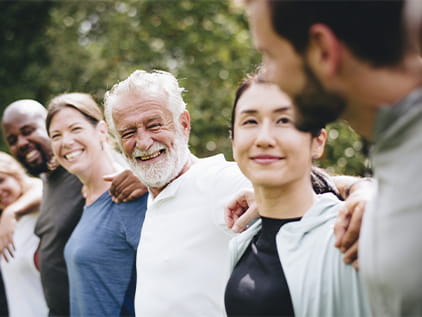Stroke and Brain Injury Rehabilitation
People who have suffered a stroke or traumatic brain injury need care both in the short- and long-term. Stroke and brain injury rehabilitation can be included as part of an overall treatment plan to help speed recovery as well as improve your quality of life. At The University of Kansas Health System, our stroke rehabilitation program addresses physical, cognitive and overall functional recovery in both inpatient and outpatient settings.
What is stroke and brain injury rehabilitation?
The goal of neurorehabilitation is to retrain your brain so you can relearn skills affected by your stroke or brain injury. Because a stroke or brain injury affects each individual differently, rehabilitation specifics vary widely.
Multidisciplinary specialists – including physical therapists, occupational therapists, speech language pathologists, rehabilitation nurses, rehabilitation neuro-rehabilitation psychologists as well as physical medicine and rehabilitation physicians – work together to provide an individualized treatment plan.
Our goal is to improve quality of life by working to restore a range of daily living functions:
- Mobility
- Speech
- Swallowing
- Independence in activities
We offer a variety of appointment types. Learn more or call 913-588-1227 to schedule now.
Who can have stroke and brain injury rehabilitation?
Anyone who struggles with daily living and everyday tasks following a stroke or brain injury can benefit from rehabilitation services. Rehabilitation after stroke or brain injury is an important part of the recovery journey.
How does stroke and brain injury rehabilitation work?
Creating a rehabilitation program is an individualized process that's customized to each person, depending on the way their stroke or brain injury has affected them. Services typically include a combination of both cognitive and physical rehabilitation exercises. Starting rehabilitation soon after a stroke or brain injury occurs is integral to regaining a maximum level of independence.
Most people start out receiving inpatient rehabilitation services. Then, as their symptoms improve, they can transition back to living independently while continuing with outpatient neurorehabilitation services.

Turning Point
Turning Point offers free classes, programs and tools designed to empower and educate people affected by chronic or serious illness.
Benefits of stroke rehabilitation
Rehabilitation services are considered essential after a stroke or traumatic brain injury to regain lost abilities, especially during the initial recovery stage. However, the severity of the injury and any resulting complications will have an impact on overall recovery. Research indicates that those people who participate in a dedicated stroke neurorehabilitation program make greater gains during recovery than those who don't receive neurorehabilitation.
What happens during stroke and brain injury rehabilitation?

Resources for stroke patients and caregivers
When you or someone you love has a stroke, you don’t have to go through it alone. Programs and support are available through local and national organizations and right here at the health system.







